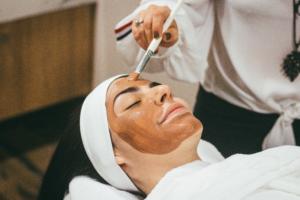Discoloration is one of the most common skin defects. Treatment for discoloration is very complex due to complicated etiology. The therapist should have solid knowledge and experience as use of many therapeutic methods, that need to be combined and often modified during the therapy might be necessary.
 Where do discoloration come from?
Where do discoloration come from?
In human skin there are cells known as melanocytes. They produce the pigment called melanin. It has a protective function against the UV radiation, because the pigment absorbs it. Melanin production increases, when the skin is exposed to the sunlight. A tan doesn’t allow deeper penetration, which could damage the DNA of cells. This is a protection mechanism created by evolution.
Our skin is “protected” by leaving more pigment in the skin when we often expose our skin to the intense sunlight. This is what we call discoloration.
Why the treatment is so complicated?
Treating pigmentation is difficult, because there are plenty of combinations and different causes of this skin problem. The sun is not the only trigger (extrinsic factor), skin irritation and hormonal disorders (intrinsic factor) also have an effect. Hormonal pigmentation is the most common concern caused by the secretion of thyroid hormones and female sex hormones. Contraceptive pill intake is also a major risk factor. The most difficult to treat is melasma, which is based on hormonal disorder. Pigmentation can also occur as a result of pregnancy, drugs, injuries and inflammation (i.e. Post Inflammatory Hyperpigmentation).
The most common types are:
- Freckles
- Melasma (chloasma)
- Lentigines (old age spots)
- Post-traumatic discolorations
- Spots like “café au lait” (in French for “coffee with milk” and refers to their light – brown colour. It’s also called “giraffe spots”, or “coast of Maine spots”)
- OTA type of birthmarks (nevus of OTA is a type of dermal melanocystosis that causes the hyperpigmentation of an eye, along with this pigment appearing on the whites of the eye).
In our clinic we offer many different treatments that can help you with your pigmentation/discoloration issues. Our Therapists are highly qualified and educated so we can assure best possible solution to your problem and make you feel good about your skin and about yourself as a result.
Get in touch with us, or pop-in for a consultation to get more info and professional advice.


